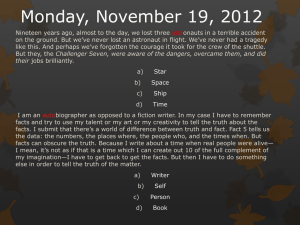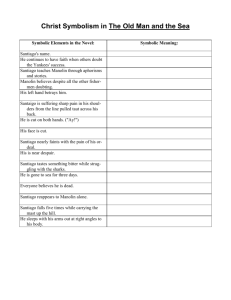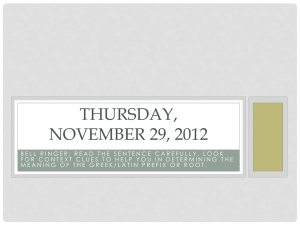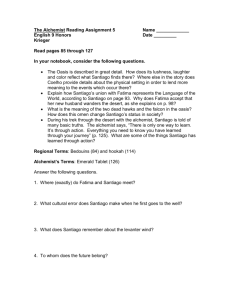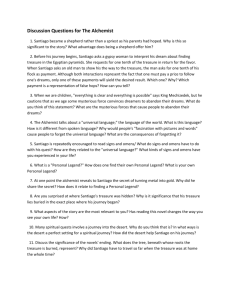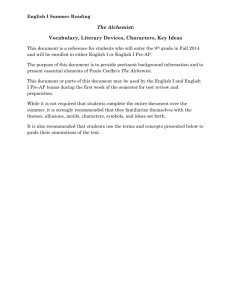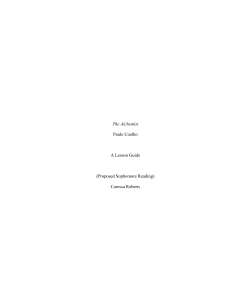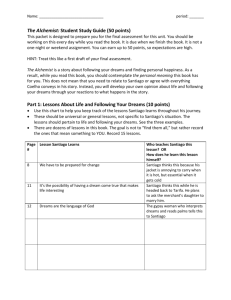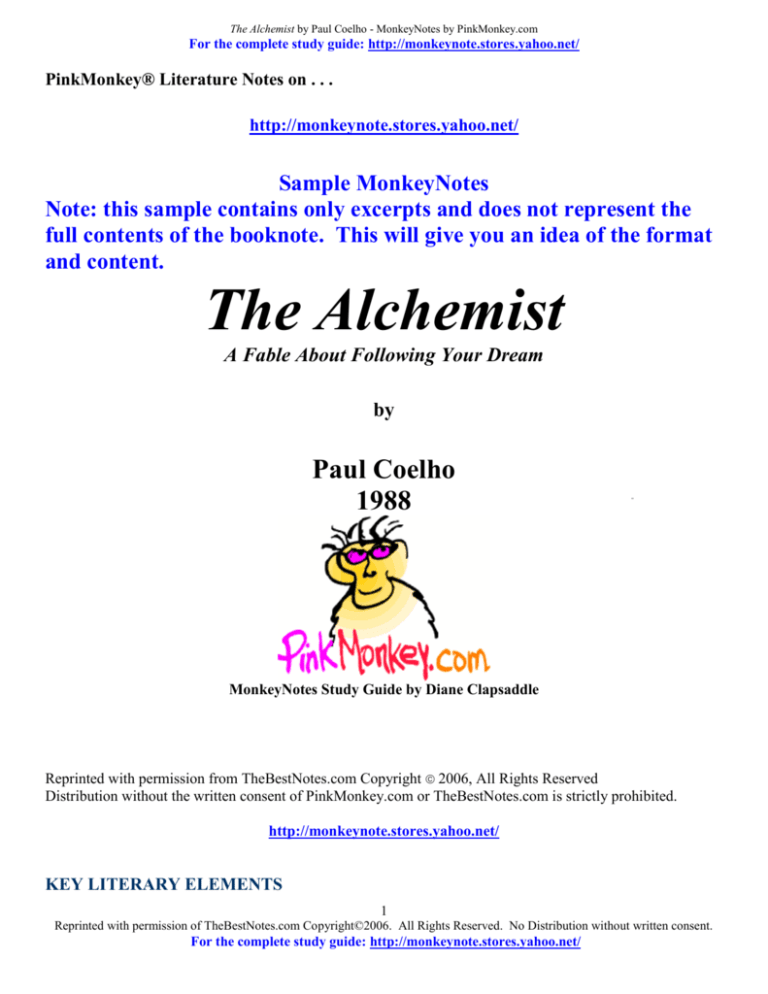
The Alchemist by Paul Coelho - MonkeyNotes by PinkMonkey.com
For the complete study guide: http://monkeynote.stores.yahoo.net/
PinkMonkey® Literature Notes on . . .
http://monkeynote.stores.yahoo.net/
Sample MonkeyNotes
Note: this sample contains only excerpts and does not represent the
full contents of the booknote. This will give you an idea of the format
and content.
The Alchemist
A Fable About Following Your Dream
by
Paul Coelho
1988
MonkeyNotes Study Guide by Diane Clapsaddle
Reprinted with permission from TheBestNotes.com Copyright 2006, All Rights Reserved
Distribution without the written consent of PinkMonkey.com or TheBestNotes.com is strictly prohibited.
http://monkeynote.stores.yahoo.net/
KEY LITERARY ELEMENTS
1
Reprinted with permission of TheBestNotes.com Copyright©2006. All Rights Reserved. No Distribution without written consent.
For the complete study guide: http://monkeynote.stores.yahoo.net/
The Alchemist by Paul Coelho - MonkeyNotes by PinkMonkey.com
For the complete study guide: http://monkeynote.stores.yahoo.net/
SETTING
The setting begins in the Andalusian region of Spain and moves to Tangier, the Al-Fayoum oasis, and
eventually the pyramids in Egypt. The story ends where it began in Spain. The time is the present day.
LIST OF CHARACTERS
MAJOR CHARACTERS
Santiago - He is a shepherd boy, who because of a recurring dream, decides to find his treasure at the pyramids
in Egypt. Along the way, he meets a Gypsy woman, an Old King, a crystal merchant, an Englishman, and an
alchemist, all of whom teach him something about fulfilling his Personal Legend and…….
The Gypsy Woman - She is the first one Santiago consults about his dream. She is mysterious and yet religious
as can be attested by the Sacred Heart of Jesus picture on her wall. She tells Santiago that because it……
The Old King - He is the second to help Santiago and gives him the stones named Urim and Thummim. He also
advises Santiago to never stop dreaming and follow the omens. His name is Melchizedek and he…….
The Crystal Merchant - He is a man for whom Santiago begins to work and who profits from the boy’s
aptitude in improving sales. He teaches Santiago how important it is to follow through and not give……
The Englishman - He is a young man who has spent ten years of his life reading about alchemy with the hope
of discovering the Master Work. He goes with Santiago on the caravan to the oasis so he can find……..
The alchemist - He is rumored to be over 200 years old and lives on the Al-Fayoum oasis. He has an advanced
sense that Santiago is coming to the oasis and knows it is his responsibility to lead him to the……
MINOR CHARACTERS
Fatima - She is the beautiful young woman whom Santiago meets at a well on the oasis. She directs them to the
alchemist, but in the process of that first conversation, Santiago falls in love with her and……
The Camel Driver - Santiago meets him on the caravan journey to the oasis and from him learns…..
The Tribal Chieftain - He demands that Santiago turn himself into the wind and in the process, discovers…..
CONFLICT
Protagonist - The protagonist of a story is the main character who traditionally undergoes some sort of change.
Santiago is the protagonist of this novel. It is his story and his maturing and learning about…..
Antagonist - The antagonist of a story is the force that provides an obstacle for the protagonist. The antagonist
does not always have to be a single character or even a character at all. The antagonists in this story change at
times – sometimes it is the people who give Santiago advice he doesn’t want to hear; sometimes it’s…..
Climax - The climax of a plot is the major turning point that allows the protagonist to resolve the conflict. The
climax comes when Santiago comes to the pyramids, digs on the spot where he sees the scarab…..
Outcome - Santiago realizes he must return to Spain after the leader of the Arab refugees who beat him tells
him his recurring dream about a ruined church with a sycamore tree growing out of its sacristy. He knows the
church, because that is where he had his dream about the pyramids. He returns there and finds……
2
Reprinted with permission of TheBestNotes.com Copyright©2006. All Rights Reserved. No Distribution without written consent.
For the complete study guide: http://monkeynote.stores.yahoo.net/
The Alchemist by Paul Coelho - MonkeyNotes by PinkMonkey.com
For the complete study guide: http://monkeynote.stores.yahoo.net/
SHORT PLOT/CHAPTER SUMMARY (Synopsis)
A young shepherd boy named Santiago has a recurring dream about a child leading him to the Pyramids of
Egypt. After a Gypsy woman tells him he must go, he meets an old king who also teaches him about omens and
following them on a path to his dream. He buys a ticket to Tangier, but is robbed of all his money when he gets
there. He is forced to work for a crystal merchant for a year to earn enough money to go home, but ……
THEMES
The theme of one’s own Personal Legend recurs many times in the story. It refers to that which is your own
dream or goal in life and is part of the path God has created for you. You have the free will to turn your back on
your Personal Legend, but it is a decision which you could live to regret. Most people never …….
Additional themes are identified in the complete study guide.
MOOD
This story is uplifting almost entirely through the novel. Even when Santiago stumbles or even falls on his path
to his treasure, we know he will get back up again and persevere. We feel his …..
BACKGROUND INFORMATION - BIOGRAPHY
Paul Coelho was born in Rio de Janeiro, Brazil, and still lives in that city. He is much like his character,
Santiago, the shepherd boy, in that he has followed a quest to be a writer and has met with much frustration
throughout his early adulthood. He says he always knew that his Personal Legend was to write, but he was
thirty-eight before he published his first book. He tried law school until 1970 when he decided to travel
throughout much of South America, North America, Mexico, and Europe. He returned to Brazil two …..
Awards for The Alchemist include:
The Nielsen Gold Book Award 2004 for its outstanding sales in the UK retail market.
The Corine International Award 2002 for the best fiction in Germany.
The Golden Book Award 1995 and 1996 in Yugoslavia.
The Super Grinzane Cavour Book Award and Flaiano International Award 1996 in Italy.
The Grand Prix Litteraire of Elle 1995 in France.
CHAPTER SUMMARIES WITH NOTES
FOREWARD - Ten Years On
Summary
The foreward was written by the author, Paulo Coelho, ten years after he had published The Alchemist. Because
the book had been such a huge success over those ten years, the author was asked, “What is the secret behind
such a huge success?” He tells us that he honestly doesn’t know. All he knows is that like Santiago, the
shepherd boy, we all need to be aware of our personal calling, or the path God has chosen for us.
He goes on to explain ideas that are extremely important in understanding The Alchemist. He begins by
explaining that whenever we do something that fills us with enthusiasm, we are following our legend. However,
we don’t all have the courage to confront out own dream because of four obstacles: first, we are told from
childhood onward that everything we want to do is impossible and so the layers of fear, prejudice, and guilt
often bury the dream very deeply. Second, if we have the courage to disinter the dream, we are then faced by
the obstacle of love. We know what we want to do, but we don’t want to hurt anyone around us by pursuing the
dream. We must come to realize that those who love us genuinely want us to be happy and are prepared to
accompany us on our journey in whatever capacity. Once we accept that love can be a stimulus to the dream,
the third obstacle crops up: fear of the defeats we will meet on the path of our journey.
3
Reprinted with permission of TheBestNotes.com Copyright©2006. All Rights Reserved. No Distribution without written consent.
For the complete study guide: http://monkeynote.stores.yahoo.net/
The Alchemist by Paul Coelho - MonkeyNotes by PinkMonkey.com
For the complete study guide: http://monkeynote.stores.yahoo.net/
The secret to conquering this fear is to understand that life is all about falling seven times and getting up eight.
Once we get past these three obstacles, we meet the fourth: the fear of realizing the dream for which we have
fought all our lives. Once we see what we can have, we are filled with guilt and forget all the previous obstacles
we had to overcome to earn the dream. But if we believe ourselves worthy of that for which we have fought so
hard, then we become the instruments of God, we help the Soul of the World, and we understand why we are
here.
Notes
This foreward to the novel lays out the foundation of what Santiago will discover when he follows his dream.
Knowing this in advance is helpful in understanding the philosophy of The Alchemist, but finding it out while
reading about the shepherd boy’s adventures is so much more satisfying!
PROLOGUE
Summary
This opening part of the novel introduces us to the alchemist who has found a book left behind by someone in a
caravan. He finds the story of Narcissus, the youth who daily knelt by a lake to contemplate his own beauty. He
eventually fell in and drowned, but where he fell a flower was born called the narcissus. But the author of the
book did not end the familiar story here as it is usually ended. Instead, he tells the reader that the goddesses of
the forest appeared and found that the lake so mourned for him that its fresh water became salty.
The goddesses assume that the lake mourns, because it could contemplate his beauty close at hand. But the lake
asks if Narcissus was beautiful. The goddesses are surprised at the question, because who could know the
answer better than the lake? The lake is silent for a moment, and then explains that it never noticed Narcissus’
beauty, because it could see, in the depth of his eyes, its own beauty reflected. The goddesses respond, “What a
lovely story.”
Notes
The prologue prepares us for what Santiago the shepherd will eventually learn in his travels: we are all joined
one to the other in some way. Narcissus’ seeming egotistical behavior was actually a way for the lake to
discover itself. We are all a part of the Soul of the World.
Note regarding the structure: Instead of breaking the story into traditional chapters, the author has separated
the sections of the text by the characters **. Thus, each section separated by ** should be considered a chapter.
PART ONE
Summary
This section opens with our introduction to Santiago, the shepherd boy, who has decided to spend the night in
an abandoned church which had fallen in long ago and now has an enormous sycamore tree growing on the spot
where the sacristy once stood. We discover immediately that he is a reader, because he uses the book he has just
finished reading as a pillow. He awakens in the middle of the night having had the same dream as the one he
had a week before, but like before, he has awakened before it ends.
So he gets up and notices that his sheep begin to awaken, too, because as he tells us, “They are so used to me
that they know my schedule.” He has a very interesting relationship with his sheep: he reads to them and he
knows the name of each one, because he believes they understand what he says. Lately, he has only spoken to
them about one thing: the daughter of the merchant who lives in the village they will reach in four days. He
takes his sheep to this shop to be sheared and the merchant buys the wool. That is how he had come to know
about his daughter. Like himself, she is Andalusian, from a region of Spain, and her appearance vaguely recalls
their Moorish ancestry. They had spent several hours together the last time he had been there talking mostly
4
Reprinted with permission of TheBestNotes.com Copyright©2006. All Rights Reserved. No Distribution without written consent.
For the complete study guide: http://monkeynote.stores.yahoo.net/
The Alchemist by Paul Coelho - MonkeyNotes by PinkMonkey.com
For the complete study guide: http://monkeynote.stores.yahoo.net/
about his travels. She wonders why a boy who knows how to read is only a shepherd. He gives her no real
answer and only knows that he was experiencing the feeling of wanting to live in one place forever.
Santiago is excited to return to the village and the merchant’s daughter, but as he moves steadily forward, it
occurs to him that his sheep stay close to him, because they are incapable of making any decisions. They trust
him and have forgotten how to rely on their own instincts, because he always leads them to food and water. In
return, they give him their wool, their company – and sometimes, their meat. It reminds him of his purpose in
life: to wander, to travel. He had attended a seminary until he was sixteen years old, but even though his parents
had wanted him to remain there and be a source of pride for them, he knew that he had wanted to see the world
and that was much more important than knowing God and the sins of man.
**
He had told his father what he wanted to do, and his father had tried to dissuade him. But when he realized
Santiago was determined, he told him that the only people who travel were shepherds and then he gave him
three gold coins to help him buy his flock. He told his son goodbye with the advice that someday he would learn
that their own countryside was the best and their women the most beautiful. In his father’s eyes, Santiago had
seen his own desire to travel which he had buried beneath the burden of finding a way to just survive.
**
Santiago muses that he is able to live out his dream every day and if he tires of it, he can always sell his sheep
and go to sea where he would come to other cities and lands to explore. Now, the dream concerns the
merchant’s daughter and he hurries his pace to Tarifa, the next village. He also remembers that, in ……..
Notes
From the first section of Part One, we see an abandoned church with a sycamore tree growing out of its sacristy.
This tree will have important significance for Santiago by the end of the novel and so is the first example of
foreshadowing. He had passed that way many times and had never come across the church, which gives it a
kind of mystic significance, and it is the place where he dreams, as we learn later, about the child showing him
the pyramids of Egypt, which starts him on his journey.
In the next few sections, we are given a sense of one of the major themes of the story: we are all part of the Soul
of the World. Santiago muses over how dependent his sheep are on him and how they seem to understand him.
He also remembers how he had told his family that he wanted to travel and how he had seen the same desire in
his father’s eyes. This prepares us for the idea of fulfilling our own Personal Legend: Santiago has…….
OVERALL ANALYSES
CHARACTER ANALYSIS
Santiago - Santiago represents each and every one of us. We walk along with him on his journey to fulfillment
of his Personal Legend and triumph with him when he achieves his goal. He is a good individual who like all
humans makes mistakes, but he has an exemplary personal code that allows him to persevere in …..
The Gypsy Woman - Although she appears in the story for a relatively short time, she is very important in
helping Santiago begin his journey to the pyramids. When he comes to her shop for an interpretation of his
dream, he finds a woman who is mysterious, but also very down-to-earth. She is a combination of superstition
and Christian faith as evidenced by the icon of the Sacred Heart of Jesus on her wall. She looks at……
The Old King - His name is Melchizedek and he is a Biblical character even as he is a character in this novel. In
5
Reprinted with permission of TheBestNotes.com Copyright©2006. All Rights Reserved. No Distribution without written consent.
For the complete study guide: http://monkeynote.stores.yahoo.net/
The Alchemist by Paul Coelho - MonkeyNotes by PinkMonkey.com
For the complete study guide: http://monkeynote.stores.yahoo.net/
the Bible, he was said to have been sent by God to give Abraham bread and wine after Abraham’s victory over
the four kings who had besieged Sodom and Gomorrah and taken his nephew prisoner. He also is……
The Crystal Merchant - This man owns a shop in Tangier where Santiago is forced to work to earn enough
money to return to Spain. At this point, Santiago has decided he’s foolish to pursue the treasure and wants only
to go home. It takes him a year to earn the money he needs, but by the end of the year, the ……
The Englishman - This character wants more than anything to achieve knowledge of the Master Work of
alchemy and is traveling to the oasis to find the alchemist. He has spent ten years of his life studying alchemy,
but has been unable to create the Elixir of Life or the Philosopher’s Stone. He is an …….
The alchemist - He is the most important of all the people who provide support to Santiago on his journey.
With just the right amount of direction and willingness to allow Santiago to find his Personal Legend on his
own, the alchemist becomes an even greater servant of God than the Old King. He goes…….
Fatima - She is the young women with whom Santiago falls in love. She is a desert woman and as such, she is
taught how she must wait for the man she loves to return to her on the oasis. If he doesn’t return, she is …..
The Camel Driver - Although a simplistic character from a working class background, this man opens up to
Santiago about how he had lost his orchards to the flooding of the Nile. From that, he had learned about …..
The Tribal Chieftain - This man has a very small part in the story. His tribe captures the alchemist and Santiago
and promises to execute them if Santiago cannot turn himself into the wind. Of all…..
PLOT STRUCTURE ANALYSIS
The story is told from omniscient point of view, meaning the reader sees and knows all things that are going on
with every character. It is divided into a foreword from the author called Ten Years On, a …..
THEMES - THEME ANALYSIS
The theme of one’s own Personal Legend occurs many times in the story. It refers to that which is your own
dream or goal in life and is part of the path God has created for you. You have the free will to turn your back on
your Personal Legend, but it is a decision which you could live to regret. Most people never achieve it, because
it is a journey filled with hardships and many turn back. For those who continue their search, the fulfillment of
their Personal Legend is immensely satisfying and rewarding. For Santiago, his Personal ……
Additional themes are analyzed in the complete study guide.
RISING ACTION
The rising action begins when Santiago sleeps in the church ruins and dreams about the child leading him to
Egypt. From there, it follows his search for his treasure from Spain to Tangier to the …..
FALLING ACTION
Santiago returns to the ruined church and digs under the sycamore tree until he finds a…..
POINT OF VIEW
The point of view is third person omniscient, which means that the reader sees and knows……
6
Reprinted with permission of TheBestNotes.com Copyright©2006. All Rights Reserved. No Distribution without written consent.
For the complete study guide: http://monkeynote.stores.yahoo.net/
The Alchemist by Paul Coelho - MonkeyNotes by PinkMonkey.com
For the complete study guide: http://monkeynote.stores.yahoo.net/
OTHER ELEMENTS
FORESHADOWING
There are several other literary devices that pop up at various times in the story. One of the most prevalent ones
is foreshadowing which frequently presents clues of something that will happen later in the novel. Some
examples of foreshadowing include:
1.) The entire foreword, Ten Years On, is a foreshadowing of the obstacles Santiago will face on his search for
his treasure.
2.) The Prologue is foreshadowing of the idea of the Soul of the World – we are all a part of each other so that
when the lake watched Narcissus, it saw only its own beauty reflected in his eyes……
Nine additional examples or foreshadowing are included in the complete study guide.
IRONY
Another element that is important to note is irony – when something happens, or is seen, or is heard that we
may know, but the characters do not, or that appears opposite of what is expected. Some examples of irony
include:
1.) It is ironic that Santiago has turned down a life in the seminary because he didn’t need God to travel with
his sheep. In the end, it is God he ultimately finds in his Personal Legend……
Five additional examples of Irony are included in the complete study guide.
PERSONIFICATION
Another element that is important to note is personification – when something that is not human takes on the
characteristics of a human being. Some examples of personification include:
1.) Santiago must listen to the words his heart speaks……
Additional examples of personification are detailed in the complete study guide.
IMPORTANT QUOTATIONS - QUOTES
(Harper Collins Publishers, Inc. 1998)
1.) “All I know is that like Santiago, the shepherd boy, we all need to be aware of our personal calling.”
(pages ix and x)
The author expresses idea in his foreword to this edition.
2.) “The secret of life, though, is to fall seven times and to get up eight times.” (page xi)
The author again voices his philosophy in the foreword of this edition……..
Twenty-two additional quotations are analyzed in the complete study guide.
SYMBOLISM / MOTIFS / IMAGERY / SYMBOLS
Other elements that are present in this novel are symbols and metaphors. Symbols are the use of some
unrelated idea to represent something else. Metaphors are direct comparisons made between one idea and
another. There are many symbols used by the author such as:
1.) Dreams represent the language of God.
2.) The baker and the crystal merchant represent the loss of the dream and the regret that follows.
3.) The ruined church represents Santiago’s treasure.
4.) Melchizedek, the Old King of Salem, represents Santiago’s need to follow the omens…….
Nineteen additional examples of symbolism are identified in the complete summary.
7
Reprinted with permission of TheBestNotes.com Copyright©2006. All Rights Reserved. No Distribution without written consent.
For the complete study guide: http://monkeynote.stores.yahoo.net/
The Alchemist by Paul Coelho - MonkeyNotes by PinkMonkey.com
For the complete study guide: http://monkeynote.stores.yahoo.net/
There are also several metaphors in this novel, including:
1.) The baker’s decision to make his bakery profitable instead of traveling around the world like he wants is a
metaphor for those of us who turn our backs on our dreams……..
Four additional examples of metaphors are listed in the complete summary.
Important/Key Facts Summary
Title: The Alchemist
Author: Paulo Coelho
Date Published: 1988
Meaning of the Title: It refers to the major character that helps Santiago find his way to the…..
STUDY QUESTIONS - MULTIPLE-CHOICE QUIZ
1. Santiago becomes a shepherd, because
a.) he hates the seminary
b.) he wants to travel
c.) he is searching for God
2. Santiago has his dream in
a.) the ruined church
b.) his room at the seminary
his bed at home……
ANSWER KEY
1.) b 2.) a 3.) c 4.) a 5.) a 6.) c 7.) a 8.) a 9.) c 10) b 11.) c 12.) a 13.) b 14.) c 15.) c
ESSAY TOPICS - BOOK REPORT IDEAS
1. Examine at least three instances where Santiago has to pay a price to fulfill his dream. Does he ever find the
price too high? Why or why not?
2. What does the author mean when he says that “alchemy is all about pursuing our spiritual quest in the
physical world as it was given to us? It is the art of transmuting reality into something sacred, of mixing the
sacred with the profane.” How does this statement apply to Santiago?…..
Eight additional items are included in the complete study guide.
Copyright ©2006 TheBestNotes.com.
Reprinted with permission of TheBestNotes.com. All Rights Reserved.
Distribution without the written consent of PinkMonkey.com and TheBestNotes.com is strictly prohibited.
END OF SAMPLE MONKEYNOTES EXCERPTS
For the complete study guide: http://monkeynote.stores.yahoo.net/
8
Reprinted with permission of TheBestNotes.com Copyright©2006. All Rights Reserved. No Distribution without written consent.
For the complete study guide: http://monkeynote.stores.yahoo.net/

